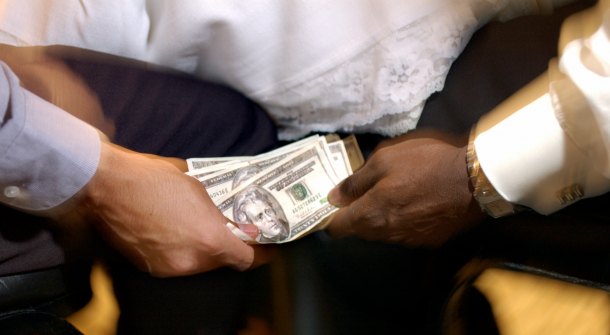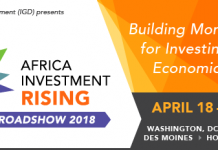A new survey by the German-based nonprofit Transparency International ranks business executives in Africa as the second most corrupt group after the police. It is the first time the poll attributes such a high level of corruption to business executives.
Transparency International partnered with Afrobarometer, a pan-African research network, which spoke to 43,143 respondents across 28 countries in sub-Saharan Africa between March 2014 and September 2015 to ask them about their experiences and perceptions of corruption in their country. It found that corruption is on the rise in Africa, with some 75 million Africans paying a bribe in the past year mainly to escape punishment by the police or courts or to get access to basic services. Most of the people polled said governments are failing in their duty to stop the abuse of power, bribery and secret deals.
The findings were published in the report, “People and Corruption: Africa Survey 2015,” as part of Transparency International’s Global Corruption Barometer.
“Corruption creates and increases poverty and exclusion. While corrupt individuals with political power enjoy a lavish life, millions of Africans are deprived of their basic needs like food, health, education, housing, access to clean water and sanitation,” said Transparency International Chair José Ugaz. “We call on governments and judges to stop corruption, eradicate impunity and implement Goal 16 of the Sustainable Development Goals to curb corruption. We also call on the people to demand honesty and transparency, and mobilize against corruption. It is time to say enough and unmask the corrupt.”
Below is a summary of the report’s key findings and recommendations.
Findings
* The majority (58 percent) of Africans in the surveyed countries, say corruption has increased over the past 12 months.
* In 18 out of the 28 countries where the polling took place, a large majority of people said their government is doing badly at fighting corruption.
* The bright spots across the continent were in Botswana, Burkina Faso, Lesotho and Senegal, where citizens were some of the most positive in the region when discussing corruption
* For the first time, people reported business executives as highly corrupt. Business ranked as having the second highest levels of corruption in the region, just below the police. The police regularly rate as highly corrupt, but the strongly negative assessment of business executives is new compared to previous surveys.
* Government officials and tax officials rank as the third and fourth most corrupt groups (38 percent and 37 percent, respectively).
* Judges and magistrates, members of parliament, local government councillors and the office of the presidency all score similarly, with around a third of people saying they are affected by high levels of corruption (between 31 percent and 34 percent).
* Traditional leaders and religious leaders are seen to be the least affected by corruption in the region, although 21 per cent and 15 per cent, respectively, say that most or all of these leaders are corrupt.
* Many Africans, particularly the poor, are burdened by corruption when trying to get access to key basic services in their country. Twenty-two percent (75 million) of people that have come into contact with a public service in the past 12 months paid a bribe.
* Of the 75 million bribe payers, 57 percent were male and 43 percent were female.
* Of the six key public services that researchers asked about, people who come into contact with the courts and police are the most likely to have paid a bribe – 28 percent and 27 percent, respectively, of people who had contact with these services paid a bribe.
* Across the continent, poor people who use public services are twice as likely as rich people to have paid a bribe; in urban areas they are even more likely to pay bribes.
* Corruption-reporting mechanisms are often seen as too dangerous, ineffective or unclear. More than 1 out of 3 Africans thinks that a whistleblower faces negative consequences for reporting corruption, which is why most people don’t report.
Recommendations
* Governments must strengthen and enforce legislation on corrupt business people and anti-money laundering to curb the high volume of illicit flows from the continent. This could address the negative perception of business if those profiting are held to account.
* Governments must establish right-to-information and whistle-blower protection legislation to facilitate the role of civil society in making public institutions more transparent, accountable and corruption-free.
* Governments must show a sustained and deep commitment to acting on police corruption at all levels by promoting reforms that combine punitive measures with structural changes over the short- and medium-term. Cracking down on petty bribery has direct impact on the most vulnerable in society.
* The African Union and its members must provide the political will and financing needed to implement the review mechanism established for its anti-corruption convention. Unless it’s stopped, corruption slows development and economic growth while weakening people’s trust in government and the accountability of public institutions.













